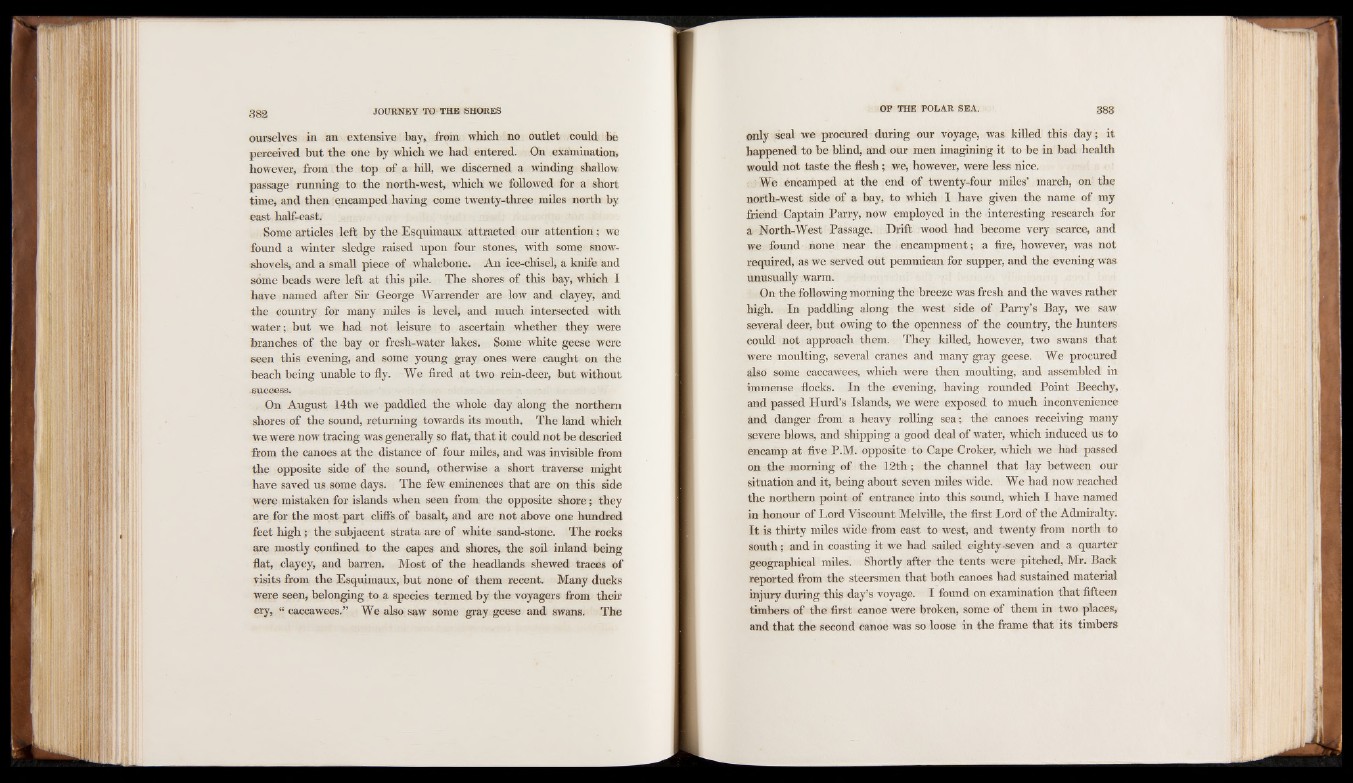
ourselves in an extensive bay» from which no outlet could be
perceived but the one by which we had entered. On examination)
however, from the top of a hill, we discerned a winding shallow
passage running to the north-west, which we followed for a short
time, and then encamped having come twenty-three miles north by
east half-east.
Some articles left by the Esquimaux attracted our attention; we
found a winter sledge raised upon four stones, with some snow-
shovels, and a small piece of whalebone. An ice-chisel, a knife and
some beads were left at this pile. The shores of this bay, which I
have named after Sir George Warrender are low and clayey, and
the country for many miles is level, and much intersected with
water; but we had not leisure to ascertain whether they were
branches of the hay or fresh-water lakes. Some white geese were
seen this evening, and some young gray ones were caught on the
beach being unable to fly. We fired at two rein-deer, but without
success.
On August 14th we paddled the whole day along the northern
shores of the sound, returning towards its mouth. The land which
we were now tracing was generally so flat, that it could not be descried
from the canoes at the distance of four miles, and was invisible from
the opposite side of the sound, otherwise a short traverse might
have saved us some days. The few eminences that are on this side
were mistaken for islands when seen from the opposite shore; they
are for the most part cliffs of basalt, and are not above one hundred
feet high; the subjacent strata are of white sand-stone. The rocks
are mostly confined to the capes and shores, the soil inland being
flat, clayey, and barren. Most of the headlands shewed traces of
visits from the Esquimaux, but none of them recent. Many ducks
were seen, belonging to a species termed by the voyagers from their
cry, “ caccawees.” We also saw some gray geese and swans. The
only seal we procured during our voyage, was killed this day; it
happened to be blind, and our men imagining it to be in bad health
would not taste the flesh; we, however, were less nice.
We encamped at the end of twenty-four miles’ march, on the
north-west side of a bay, to which I have given the name of my
friend Captain Parry, now employed in the interesting research for
a North-West Passage. Drift wood had become very scarce, and
we found none near the encampment; a firé, however, was not
required, as we served out pemmican for supper, and the evening was
unusually warm.
On the following morning the breeze was fresh and the waves rather
high. In paddling along the west side of Parry’s Bay, we saw
several deer, but owing to the openness of the country, the hunters
could not approach them. They killed, however, two swans that
were moulting, several cranes and many gray geese. We procured
also some caccawees, which were then moulting, and assembled in
immense flocks. In the evening, having rounded Point Beechy,
and passed Hurd’s Islands, we were exposed to much inconvenience
and danger from a heavy rolling sea; thé canoes receiving many
severe blows, and shipping a good deal of water, which induced us to
encamp at five P.M. opposite to Cape Croker, which we had passed
on the morning of the 12th ; the channel that lay between our
situation and it, being about seven miles wide. We had now reached
the northern point of entrance into this sound, which I have named
in honour of Lord Viscount Melville, the first Lord of the Admiralty.
It is thirty miles wide from east to west, and twenty from north to
south; and in coasting it we had sailed eighty-seven and a quarter
geographical miles. Shortly after the tents were pitched, Mr. Back
reported from the steersmen that both canoes had sustained material
injury during this day’s voyage. I found on examination that fifteen
timbers of the first canoe were broken, some of them in two places,
and that the second canoe was so loose in the frame that its timbers